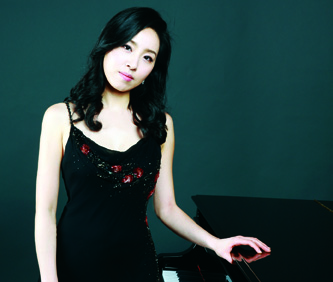Kyung-Hye Baek in Review
Kyung-Hye Baek, piano Weill Hall at Carnegie Hall, New York October 15, 2012If musical career-building were analogous to cooking, Kyung-Hye Baek might be said to have “the recipe.” Among the sought-after ingredients these days – conservatory studies (a doctorate from Peabody), the requisite recital and orchestral performances (various appearances in Korea, the U.S., and Europe), a sprinkling of competition prizes (the Daegu Music Association and others), and the cherry on top of a Weill Hall New York debut – all of these are now counted among her credits. Throw in an elegant stage presence, and the table might seem to be set; what remains to be seen, however, is the extent of her musical passion and where it will take her and her audiences.
The musical menu on Ms. Baek’s recent Weill Hall recital, while varied, consisted of mainstays of the piano repertoire: two Scarlatti Sonatas (the perennially popular B Minor K. 27 and D minor, K. 141), Haydn’s buoyant Sonata in G Major, Hob. XVI: 40, Beethoven’s stormy Sonata Op. 57 (the “Appassionata”), a set of lyrical Schubert-Liszt songs, and Prokofiev’s thorny Sonata No. 6. On paper, this seemed a program of huge range, as one is accustomed to large differences of sound and approach from one style to the next, but the end result in Ms. Baek’s hands was somewhat more homogeneous than one expected, with all works characterized by a similar glossy polish. Each piece was played with secure memory, reliable fingers, and a sound that was never strident. At climaxes, Ms. Baek did use the bass resonance of the hall’s Steinway to good advantage (if sometimes overwhelming the treble in the Scarlatti and Beethoven), but one could have enjoyed a larger dynamic range.
Among some high points were some excellent repeated notes, as heard in the Scarlatti D Minor Sonata, aka the “Toccata,” and also in the Haydn. Ms. Baek never overdid the Haydn’s inherent humor, but let the structural “punch lines” speak for themselves. One wanted more contrast at times, but the Presto was full of drive and momentum, if occasionally a bit too hectic for this listener.
Beethoven’s Appassionata Sonata was performed rather conservatively, missing some of its usual fire, but in terms of neatness and care, it lacked for little. One sometimes wonders whether proliferating doctoral piano programs might not be prolonging the sort of “defensive playing” that stems from extra years of jury exams and evaluations, shielding young players from the excitement of “going for broke” before live audiences. At any rate, if one is offering chiefly mainstream repertoire, there is additional reason to try to bring it a new dimension interpretively. These new dimensions may come with time and freedom from academic boundaries. Meanwhile, the pianist has a more than solid grounding and tremendous untapped potential.
Ms. Baek showed fine discipline in the voicing of her Schubert-Liszt, playing Ständchen, Gretchen am Spinnrade, Aufenthalt, and Auf dem Wasser zu singen, and these were also highlights. She showed a good deal of patience and maturity in her weaving of melodic lines and created a lovely silken sound. One wonders whether there might be Schubert Sonatas and chamber music in Ms. Baek’s future, judging by the lyricism in which she seems so at home.
The evening closed with the first of Prokofiev’s “War Sonatas” -given a refined performance – too refined, in fact, for this listener’s taste. An angry and craggy piece, it usually evokes more in the way of outbursts, but Ms. Baek stressed its cerebral aspects. Though this listener wanted more, the work did close with strength. Warm applause elicited an encore of “October” from “The Seasons” by Tchaikovsky.

